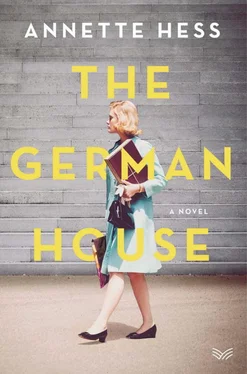1 ...6 7 8 10 11 12 ...68 “It’s Swiss cheese, Walli. You like that.”
“At least Switzerland is neutral.”
Walther Schoormann took a careful bite and began to chew. He sometimes forgot to swallow. Brigitte gave him an encouraging nod. She’s a blessing , Jürgen thought. He was certain his mother would approve. The first Frau Schoormann, whose gentle face appeared in soft focus in a photograph on the sideboard, had been killed in an air raid on the city in March of ’44. Jürgen, then ten, was living on a farm in the Allgäu region, where his parents had sent him. The farmer’s son told him his mother had burned up, that she had run through the streets like a flaming torch. Screaming. Jürgen knew the boy just wished to torment him, but he couldn’t escape the image. He began to hate everything. Even the good Lord. He nearly lost himself to it. His father was in prison at the time. The Gestapo had picked him up in the summer of ’41 for his membership in the Communist Party. On an early morning two months after the war ended, he appeared on the farm in the Allgäu to get his son. Jürgen shot out of the house and embraced his father, refusing to let go and crying so hard and for so long that even the farmer’s son had pitied him. Walther Schoormann hadn’t said anything then, and even now, he refused to speak about his time in prison. Since falling ill, however, he had taken to spending hours in the little garden shed, perched on a stool and looking out the barred windows, as though an eternal prisoner. Whenever Brigitte or Jürgen took his arm and tried to lead him out, he fought back. Jürgen was baffled by this, but Brigitte believed that his father was doing it perhaps to come to terms with something he’d experienced. Walther Schoormann swallowed and took another bite, lost in thought. The bread and cheese tasted good. As a former Communist and later businessman, he was a much-respected anomaly. He had always insisted, however, that his social attitudes were the very reasons for his success after the war. He wanted to help those people who had lost everything by offering affordable products. Affordable because he bypassed retailers, saved on sales and distribution, rent, and employees, and delivered straight to households. Within ten years, the “Schoormann Shop” grew into a company of 650 employees, whose proper treatment and social security Walther Schoormann always prioritized. In the mid-fifties, he built a house in the Taunus hills that turned out a little too big. Its many rooms served no purpose, and the pool was only filled that first year. The blue-tiled basin remained drained and deserted after that. Now, five years after Walther Schoormann remarried—one of the underwear models from the Schoormann catalog, thirty years his junior, worldly and ever optimistic—there was at least one person in the house who appreciated the luxury. The pool was filled with water once more, and Brigitte swam her daily laps. The smell of chlorine gently pervaded the house again. Eva would live here too, and maybe even swim , Jürgen thought. Eva. He knew she was waiting for his call. But something he could not pinpoint—nor wanted to—was holding him back. Jürgen had wanted to become a priest since childhood. The captivating rituals, numbing smell of incense, magnificent robes, and infinitely towering naves had fascinated him. And God undoubtedly existed. His devout mother supported his inclinations and played Mass with five-year-old Jürgen. She sewed him a purple cassock, and when he stood at the little table in his room and intoned “O Lamb of God…” she represented the congregation and humbly responded, “Hosanna.” Lit candles and incense were the only things he was not allowed. His father, an unwavering atheist, always disparaged the performances. And when, shortly before his final exams in secondary school, Jürgen expressed his wish to study theology, father and son found themselves at odds. Ultimately, Walther Schoormann deferred to the wishes of his late wife. Jürgen was free to begin his studies. But everything changed two years ago. Walther could no longer be left alone, the company suffered marked losses under a succession of new managers, and Jürgen traded in his life plan for his father’s lifework. But if he was honest, the idea of celibacy had increasingly concerned him. Eva. She had come to the office a few times to translate correspondence with their Polish suppliers. The first thing he noticed was her hair, which she wore in an updo, rather than a more current style. There was something touchingly antiquated and naive about her, he found. She would take direction—she would behave in subservience to her husband. He wanted to have children with her. Only he wasn’t sure what would happen when he confessed to his father that Eva’s family ran a restaurant on Berger Strasse, of all places. It helped that the Bruhnses were Protestants. But a restaurant in the “merry village” of Bornheim? No matter how innocent Eva was or how vehemently Jürgen stressed that their business was in the decent section of the street—anything on Berger had to be a flophouse! Walther Schoormann was not only a socialist businessman, he was also one of the rare examples of a prudish Communist.
“Jürgen, what’s so funny? Can I get in on the joke?” His father looked at him directly, his eyes clear, as though a line in his brain had been reactivated. Jürgen set down his silverware.
“Do you know what Schurick wanted to include in the catalog? An electrical device that pokes holes in eggs. Apparently it’s all the rage in America.”
His father smiled, and Brigitte shrugged. “I’d buy one.”
“Because you’d buy anything.”
Walther Schoormann took Brigitte’s hand and gave it a quick, but loving, kiss, then held on to it. Jürgen looked past the two into the snowy yard, which resembled a park. The outdoor lamps wore snowy caps. The bushes were still. He had to call Eva.
Eva sat at her desk, an extremely useful piece of furniture, and made an attempt at a letter to Jürgen. She voiced rage and disappointment and threatened blackmail, while also attempting to spark love and desire for her and her body and her virginity (which, of course, he didn’t know no longer existed). It was useless. She crumpled up another piece of paper, sat there for a moment, at a loss, and then pulled the business card David had left out of her pocket. She turned it indecisively. There was a knock on the door, and Annegret came into the room. She was wearing her powder pink dressing gown and hadn’t put on her face or done her hair. Eva welcomed the interruption. She put the business card on the table.
“Don’t you have work?”
“I have off. I worked a double shift yesterday.” Annegret dropped heavily onto Eva’s bed and leaned back against one of the posts. She’d found a package of pretzel sticks in the pantry, and she pulled them out by the dozen and snapped them off in her mouth.
“We’ve got a newborn, a boy, two weeks old, who almost died. He was totally dehydrated.”
“Again?”
“Yes, it really isn’t funny anymore. Someone must be carrying these germs in. The doctors, they can’t be bothered about hygiene, but of course there’s no talking to them. I sat with the tiny bean for eight hours and kept giving him sugar water, one drop at a time. Little fellow was in pretty good shape again by the end.”
Annegret’s eyes fell on the balled-up papers.
“Has he still not been in touch?”
Eva didn’t respond. Annegret hesitated. She pulled a pack of cards from the pocket of her dressing gown and waved them invitingly. Eva sat down across from her sister on the bed. Annegret shuffled the cards in a quick, practiced manner with her fat but supple fingers. She was wheezing slightly. Then she set the cards on the blanket between her and her sister. “Ask a question. Then draw a card.”
Читать дальше
Конец ознакомительного отрывка
Купить книгу












